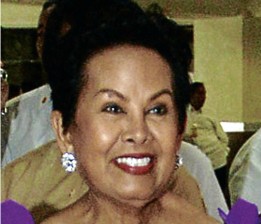Binay wife hits Ombudsman for reviving cases
MANILA, Philippines—The lawyers of former Makati Mayor Elenita Binay on Thursday scored the Office of the Special Prosecutor of the Office of the Ombudsman for resurrecting three more dismissed cases against their client.
In a manifestation filed in the Sandiganbayan’s Third Division, counsel Felicitas Aquino of the Yorac, Arroyo, Chua, Caedo and Coronel law firm decried what they called the “repeated violations of her constitutional right to due process.”
The filing of new cases brings to four the number of cases against the former mayor and wife of Vice President Jejomar Binay.
“Mrs. Binay was deprived of her right to due process when the Office of the Special Prosecutor included her again in the four graft cases despite the fact that the dismissal of the cases has become final and executory,” the lawyer said in the manifestation.
The case stemmed from the alleged overpricing of hospital beds at Ospital ng Makati. Binay was originally included in the complaint, along with several city officials.
Article continues after this advertisementThe lawyers said all complaints against the former mayor were filed more than 10 years ago and dismissed in 2011. But the other coaccused filed a motion for reconsideration, prompting the court to direct the Office of the Special Prosecutor to act on the motion.
Article continues after this advertisementThe special prosecutor again included Binay in its resolution dated Aug. 29, 2013.
Final, executory dismissal
Binay’s lawyers earlier filed a motion for clarification/motion for reconsideration in the Office of the Ombudsman on Feb. 5, asking it to throw out its special prosecutor’s finding of probable cause, citing the “final and executory” dismissal of the cases two years ago.
They also filed a motion in the Sandiganbayan to suspend all proceedings and to order the Ombudsman to complete the preliminary investigation on the motion for reconsideration, which she filed in the office, and resolve the issues raised in the motion for reconsideration.
In assailing the Office of the Special Prosecutor, the lawyers said the new finding of probable cause was based on the motions for reconsideration filed by the corespondents who were not dropped from the complaint.
They added that Binay never received a copy of the motions for reconsideration filed by the corespondents and was thus never given the opportunity to be heard.
“The former mayor, Dr. Binay, was not notified of the reinvestigation based on motions for reconsideration filed by corespondents, thus depriving her of her right to due process,” the lawyers said.
“Indeed, the unwarranted review of the instant cases with respect to the dismissal of the charges against respondent Binay, on motion for reconsideration of the aggrieved party, runs afoul of the well-established doctrine of finality of judgment, which is grounded on fundamental considerations of public policy and sound practice,” they added.
The lawyers cited the court’s ruling in Tupaz v. Hon Apurillo, which stated, “After the lapse of the 15-day reglamentary period to appeal, an order becomes executory and it goes beyond the jurisdiction of the court that rendered it to further amend or revoke.”
The decision said the subsequent filing of a motion for reconsideration “cannot disturb the finality of a judgment nor restore jurisdiction that has already been lost.”
The former mayor’s lawyers also stressed that her right to due process was violated because she never received any pleadings or legal process from the Ombudsman after the case was dismissed.
The lawyers stressed that their client was not even furnished a copy of the other respondents’ motion for reconsideration. Neither was she informed and ordered to file a motion for reconsideration.
Deprived of right to be heard
When the special prosecutor of the Ombudsman asked the Sandiganbayan to issue an amended information to include her in the graft cases without considering her side, “she was effectively deprived of her right to be heard, which is fatal to the assailed memorandum [on consolidated resolution including her in the case] issued by this Honorable Office.”
They stressed that this “inordinate delay” violated the rules requiring the Ombudsman to act promptly on a case and thus violated the former mayor’s right to due process and the speedy resolution of the cases against her.
The lawyers cited the Supreme Court’s ruling in Angchanco Jr. v. Ombudsman where the high court cited the Tatad v. Sandiganbayan case where it ruled that the delay of more than six years by the Ombudsman in resolving criminal complaints against a petitioner “to be violative of his constitutionally guaranteed right to due process and a speedy disposition of the cases against him, thus warranting the dismissal of the said criminal cases.”
The Vice President described the decision of the Special Prosecutor as “glaring acts of abuse of authority and violation of her rights.”
